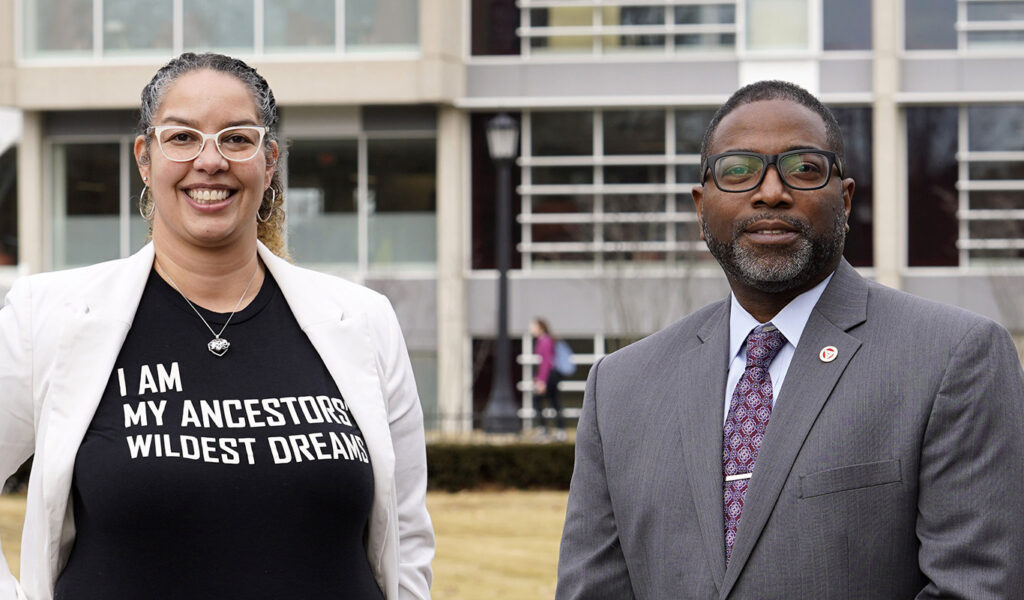February 25, 2022
By Felicia R. Lundquist, MEd, Director
Office of Diversity, Equity, and Inclusion

As February comes to a close, Director of the Office of Diversity, Equity, and Inclusion Felicia Lundquist and Vice President for Inclusion and Community Engagement Calvin Hill, PhD, discuss why it is important to commemorate Black History Month.
Black History Month is an opportunity for the Springfield College community, on the campus and beyond, to recognize shared history, movements, and activism as scholarship that increase awareness and achievement in telling the stories of Black history. The opportunity to give voice to this important history begins with the five As: awareness, access, acknowledgment, appreciation, and activism.
Carter G. Woodson, PhD, said “If a race has no history, it has no worthwhile tradition, it becomes a negligible factor in the thought of the world, and it stands in danger of being exterminated.”
Woodson, an historian, scholar, and activist, was known as the father of Black history, and Black History Month is rooted in Negro History Week that Woodson began in 1926.
Freedom Schools–free schools for African Americans that were organized primarily in the South during the Civil Rights Movement–embraced the week and the curriculum. The effort was a direct challenge to academia, specifically the White-centric ideologies fed to folx while the histories of people of color, more specifically Black people were not reflected in history books.
Not only was this important part of our history ignored, Blacks did not have the access to education or establishments that could change how we told history. Thus was the call for social and political equality–to remedy the erasure of Black people, especially Black women–and to build greater racial and cultural knowledge and awareness.
There was, and still is, a call to develop awareness, share information, and preserve accurate history, a call to bring forth the untold history, reminding folx that our society would not be as wealthy and sustainable today if it were not for the hard work, courage, struggle, and resilience of Black folx who came before us in the face of oppression. We live in a society with dominant culture, where systems aren’t designed for Black people, and where Black people are disproportionately impacted by unemployment, incarceration, and murder when compared with Whites.
By the mid 1960s, Negro History Week expanded, emerged, and evolved, and colleges and universities across the country began to observe Black History Month. Today, this month continues to be a call to action for all folx to speak truth to power, to further scholarship on African American history, so that in paying attention to the Black narrative, Black history is appreciated all year long–24/7/365–,while simultaneously influencing, shaping and advancing Black people.

It is a time for acknowledgment. The Civil Rights Movement, beginning in the late 1940s and ending in the late 1960s, was an effort by Black Americans to acknowledge the inequities, harm, and violence against Black bodies, and an attempt to end racial discrimination and gain equal rights under the law. It is abhorrent that it wasn’t until 2020 that the Emmett Till Antilynching Act, an act necessitated by a murder that took place in 1955, was passed.
It is time to move beyond the performative into transformative. Movements such as Black Lives Matter have helped to build greater awareness and appreciation for the contributions of activists like Alicia Garza, Patrisse Cullors, Opal Tometi, Angela Davis, Audre Lorde, Kimberle Crenshaw, Ida B. Wells, Harriet Tubman, Fannie Lou Hamer, Coretta Scott King, Bettye Shabazz, Maya Angelou, bell hooks, Toni Morrison, Alice Walker, and Michelle Alexander.
For me, Black History Month is a time for the celebration of Blackness, Black love and being unapologetically Black. It’s about amplifying the Black experience and acknowledging and appreciating our ancestors and their too often hidden contributions, and it is a time to reflect on the work still to be done.
Editor’s Note: Carter G. Woodson, PhD, (1875-1950), was the author of “The Mis-Education of the Negro,” published in 1933, and founder of the Association for the Study of Negro Life and History, the Journal of Negro History, and Negro History Week.
TAGS:







